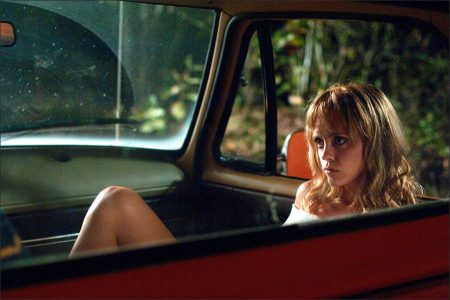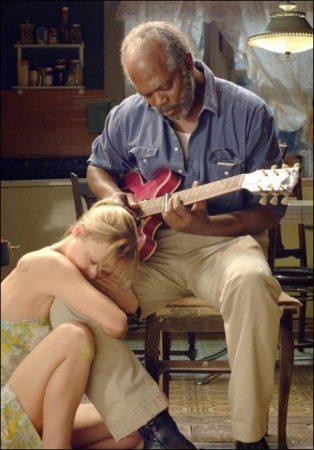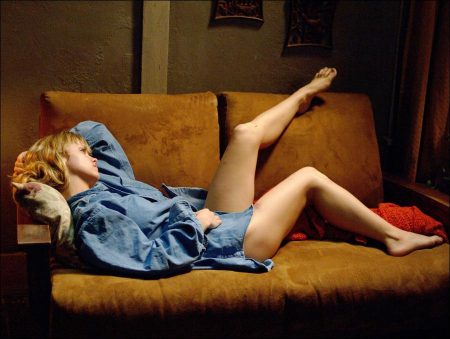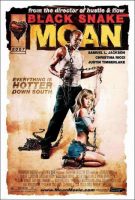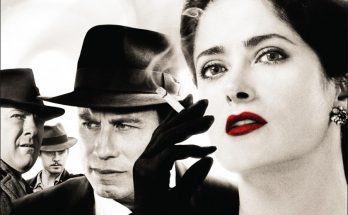The Moan of Love’s Torment
“There is a balm in Gilead to make the wounded whole. There is a balm in Gilead to save my sick, sick soul…” – Angela
Fate can be a twisted sister when it comes to rescue, and when it comes to love’s torment, rescue can come in the pairing of the most disparate souls. Fate found that coupling in Lazarus and Rae.
“BLACK SNAKE MOAN is really about two very different people coming together to heal each other,” says Writer-Director Craig Brewer, “and it is a very strange set of circumstances that brings these two people together.”
It is an audacious story and a phenomenal script that had Producer John Singleton wondering, “how in the hell we were going to get this picture made.” Singleton, who received Academy Award nominations for Best Original Screenplay and Best Director for his bold and controversial Boyz N The Hood, calls BLACK SNAKE MOAN “much more daring than Craig’s other picture (Hustle & Flow). It is certainly something people have never seen before.”
But it bares Brewer’s indelible trademark of traversing the raw metamorphosis of deeply wounded people, hungry for a better life. “We’re all wounded in some way. We all have our weaknesses, our anxieties, our foibles, and the way we get through life is by that connection, to actually be connected to someone else,” says Producer Stephanie Allain, who championed the making of both Singleton’s Boyz N The Hood and Brewer’s Hustle & Flow.
“Craig’s work allows us to put ourselves into somebody else’s shoes. In the beginning, you may not relate to it. You may not want to relate to it. You may even feel a certain sense of judgment, hostility or negativity towards it, but by the end of the movie, you love these characters, and not only do you love them, you realize you are them. It really is all about the power of being connected to someone else,” she says, “and in this case it’s Rae’s connection to Lazarus.”
It is the story of Lazarus, who packed away his guitar playing, juke joint days, found religion and settled for the married life. “He put all his love into this woman and at the beginning of the story she’s leaving him,” says Brewer. She’s not just walking out the door; she’s leaving him for his younger brother Deke. “Lazarus is an older guy, and it is breaking him apart. After falling into sorrow and darkness, he reaches for that guitar that’s been under the bed for the past 10 years. He used to be a blues man back in the day. He used to play and be a real hard cat, but he put all of that behind him.”
“Lazarus had become a man of the land,” elaborates Samuel L. Jackson, an Academy Award and Golden Globe nominee (Pulp Fiction). “Going away from music, his life had become sedate and, in a way, boring; certainly boring enough for him to lose his wife to his brother. Then he finds this girl and tries to take a measure of control over her.”
It is Rae, “this wild girl, your town slut. That’s what many people would think of her,” continues Brewer, “but Rae is a girl suffering from intense anxiety. She has this past and this abuse that really takes hold of her sexually. It is easier for her to reach this tilt of emotion and physical exertion that makes it all go away.”
Just hours after Ronnie (Justin Timberlake), her true love, leaves for boot camp, Rae numbs her misery by binging on sex and drugs. She even hustles Ronnie’s best friend Gil (Michael Raymond-James). He beats and leaves her on the side of the road. Lazarus finds her, takes her home and nurses her back to health.
Aside from curing Rae of her wickedness, Lazarus is “really an old man who wants to say a few things to a woman who’s been running around on people,” says Brewer. “He’s got some deeply rooted male vengeance that he wants to unleash on her. At the same time, they find this connection with each other – a connection that goes far beyond this chain he’s put around her waist.”
The connection evolves through a test of wills. “No matter what she does to throw herself at him, he pushes her away,” adds Jackson. “She’s not used to being unable to use her sexuality to get what she wants. This guy frustrates her, but he takes care of her, nurtures her, and eventually frees her in another kind of way.”
When Rae emerges from her semi-psychotic state and realizes a man has wrapped a long heavy chain around her waist and locked it to his farmhouse radiator, she goes ballistic. “I think she’s probably thinking about all of the horror stories she’s heard about psycho-killers in the woods,” says Christina Ricci of her character. “She’s wondering, ‘what did I get myself into now?’.” But Rae has no sense of boundaries. “Most people would have a big problem with that chain around their waist for a long time,” quips Ricci.
“Rae has had a terrible life because of what has been done to her and what she has done to herself. Because of that, her thinking is pretty twisted,” she says. “Abuse and love always came in the same package, so for her that chain meant ‘oh, he loves me’. What’s strange is, he really does come to love her and she grows to love him, in the right way, not as you would think. The chain, ironically, becomes a metaphor for their lives together – a link no one can ever break.”
Until Lazarus, Ronnie was the only decent love Rae had ever encountered. He is the only dependable person in her life. “He has internal problems too,” notes Singleton, “but when they are together they form a unit and feel at peace with each other.”
“They are the small town dream,” says Justin Timberlake, the two-time Grammy Award winner who plays Ronnie. “They are young and in love, and they want to get out and start a new life together. They will probably never leave, and that is where their problems come from. Despite their issues, Ronnie is the only one who understands Rae’s weakness and how to help her deal with it.”
When Ronnie leaves, Rae’s self-control is threadbare. When Lazarus finds her, “he tries to take a measure of control,” says Jackson. It is Preacher R.L. (John Cothran) who helps Lazarus measure his self-control. Lifelong friends, “both of these men are spiritual in non-traditional ways. R.L. is a regular guy,” says Cothran. “Despite the fact that he wears a collar, has a congregation and totes a Bible a lot of the time, he knows that fundamentally he is exactly like Laz. These two guys suffer from the same things. In fact, when R.L. is talking to Rae he tells her, ‘I’m full of sin, just like the world is full of evil.’ So he knows exactly where he is. He’s not deluded.
Lazarus’ quest to take control of Rae leads him back to music. “It gives him a new sense of self,” relates Jackson. “The more he gets back to it, the more he becomes himself again. He finds his strength, confidence and compassion. He knows that music is part of the way for him to have a better life.”
The other part is love – and the trust of a good woman. He begins that slow dance with Angela (S. Epatha Merkerson). “She’s probably had a little thing for Laz for years,” says Merkerson, a Golden Globe and Emmy Award winner (Law and Order). “Angela knows who Laz was married to, and she didn’t agree with that woman. She knows Laz to be the good man that he is. She finds herself with an opportunity to show this man how she feels about him, and then she meets this young girl Rae who is a part of his life. She doesn’t quite understand what’s going on, but she decides to trust this man that she loves.”
Angela’s faith in love keeps her filled with hope. “She does require something from Laz and that is his honesty,” says Merkerson. “It’s not that she comes to him as an angel, but she comes to him with her own set of issues and her own background.” She also comes to him on common ground: A desire to sing the music of her soul. It may be gospel music, not the blues, but to Lazarus, Angela is his Angel of mercy. Resurrected, Lazarus realizes he could have it all – religion, the love of a good woman and the blues.
Licks On A Guitar
You know you home, old man. You just walked through the door. – Preacher R.L.
“‘What is it that I don’t have? /What is it that I need? /Am I going to hell? /Where’s my woman? /I gotta have that woman. /Where’s my man? /I gotta have that man.’ When you start really listening to the music, you feel you are listening to something that is truly at its irreducible essence: One man, one guitar and a whole lotta pain.”
“This,” Brewer emphasizes, “is about the blues.” “I’m not talking about singing “Mustang Sally” on a cruise ship with blue-haired ladies dancing. I’m talking about north Mississippi, blood and guts blues. This is not pretty music. This is music that comes from a raw, emotional state of need.”
In the film, vintage footage of 1930s blues legend and former Paramount Records recording artist Son House, makes it clear: “There’s only one kind of blues…that consists between male and female.”
That is what BLACK SNAKE MOAN is all about. “A lot of people ask me, ‘Why did you name this movie BLACK SNAKE MOAN?’ Well, there’s this song called ‘Black Snake Moan,’ by Blind Lemon Jefferson, and I think that it’s one of the most haunting, wicked blues songs of all time. A lot of his music is viewed with this sense of fear of the unknown. What’s in my room? What’s crawling around? Somebody, come help me.”
Memphis Producer and the film’s Music Supervisor Scott Bomar said, “Jefferson wrote the song about going blind, and there is a line in the song about ‘black snakes crawling over me.’
It was this darkness that was coming over him, and he called it a black snake.” “It proved the perfect metaphor for a pivotal scene in the film,” adds Brewer. “There is a moment in the movie where Lazarus and Rae are confronting their darkest secrets. Locked in a house in the country with no one around you and the right amount of thunderstorms on your back and moonshine in your mug, you’re just going to tap into something that’s really primal. That’s what that song is, and after it plays and they experience it, the two of them are never the same. They are tied to each other forever.”
It is from the spirit of that song that the film drew its title. “The only way to make BLACK SNAKE MOAN come about,” says Brewer, “was to immerse the cast in the world where that music breeds: Memphis.”
“I was in New York doing press for another film, and I happened to be in the Waldorf during the Rock ‘n’ Roll Hall of Fame,” recalls Jackson. “I was standing there, watching U2, and all of a sudden a voice behind me says, ‘You know, you ought to play a blues musician in a movie and let me teach you how to play the guitar.’ I turned around and it was Felicia Collins, who plays guitar on the David Letterman show. I said, ‘Yeah, okay, if that ever happens, I’ll definitely do that.’ A couple of weeks later I talked to Craig and all of a sudden I had the job. They sent the guitar to New York. I called Felicia and started taking lessons. I had started Snakes on a Plane and when I got to Vancouver the prop man saw me with this guitar case. As it turns out, Luther the prop master was a master guitarist. So everyday at lunch he was in my trailer, beating me down on this guitar.”
Jackson’s traveling days were ahead of him. “We got Sam Jackson down into Mississippi, into Clarksdale and areas around Oxford,” tells Brewer. “We got him with people like Big Jack Johnson, Kenny Brown, Cedric Burnside and Sam Carr – all north Mississippi legends with their own particular sound.”
During one of the early trips through the Delta blues basin with Jackson and Brewer, “we visited all these studios and musicians in Mississippi,” says Bomar, who previously collaborated with Brewer on Hustle & Flow. “Every stop we made, the musicians would sit down with Sam and show him licks on the guitar, teach him songs. It was that trip that really brought everything together. We had Sam’s input as to what songs he liked. We started to fine tune it and figure out what Lazarus was going to perform.”
Jackson credits his two previous and “extremely good teachers” with prepping him for his Delta tour. “We went through several different places, and I actually got to sit down and play with Big Jack Johnson. Apparently, I was just supposed to play the guitar. Bizarre set up.”
It proved to be a magic moment for the director. “The great thing that I’ve learned about Samuel L. Jackson is he is strong enough to allow himself to be taught by great people,” says Brewer. “Sam goes into Big Jack Johnson’s house and Big Jack just puts a guitar in his hands. A half-hour in and there’s Sam – never played this song before – and he’s doing it. He’s doing it well, to the point where Big Jack Johnson was like, ‘Man, get outta my house.’ That’s a big deal. That started the journey. Sam got that guitar in his hands, and he just never put it down.”
The producers and director credit Bomar for bringing all of the critical blues elements together on BLACK SNAKE MOAN. Allain, Singleton and Brewer say it was Bomar who pulled together the music that drove HUSTLE & FLOW, a film that took home the Academy Award for Best Song. “Craig was really insistent that Scott do the music,” Allain adds. “He was so right because Scott is basically responsible for bringing together these legends, like Skip Pitts and Willy Hall, who call themselves the Bo-Keys. He’s put together an incredible roster of blues musicians who are playing on the soundtrack and also as characters in the movie.”
With the blues, Bomar was entirely in his element. “When I was in high school, I would go down to Holy Springs, Mississippi to Junior Kimbrough’s Juke Joint. Every Sunday night they would crank up the music in this shack off the highway, in the middle of nowhere, about 45 minutes south of Memphis,” he recalls. “Being able to experience that was one of the biggest influences on music in my life. There’s just really nothing like it. Junior Kimbrough would play with his sons and R.L. Burnside would perform with his sons. One of the primary inspirations for Lazarus and his music in the film is R.L. Burnside. R.L. performed his entire life and for most of his life he performed at these little jukes out in the country. He’d play for whiskey or a few dollars. He died during pre-production,” Bomar says, “but, for Craig, his music was the big inspiration for Laz and his music. In the film, Laz performs a song called ‘Alice Mae,’ which is an R.L. Burnside song. Alice Mae is R.L.’s wife.” Although R.L. is gone, two of his longstanding band members perform in the film. “We have R.L.’s grandson, Cedric Burnside, playing drums and R.L.’s guitar player, Kenny Brown,” says Bomar. “Over time, Kenny and Cedric became R.L. Burnside’s backup band, toured the country, played on Letterman and made a lot of great records. That’s who we have to back up Samuel L. Jackson for the juke joint scene.”
It is the scene where Lazarus gets his mojo back, the scene where Preacher R.L. welcomes Lazarus back into the juke joint fold. “Rae is once again completely rejected by her mom and very depressed,” tells Brewer.
“Laz knows a way to make her feel better; he takes her to the juke joint. He gets on stage and plays. She ends up dancing and feeling warm, accepted and safe, which is something Rae doesn’t feel very often.”
The scene is typical of the scene that plays out just about every Friday and Saturday night around Memphis. “They go down to the local juke, plug their electric guitar into an amp, blare it really loud and bring it to you raw,” Brewer says. “When we filmed this juke joint scene, we had all these extras, and they knew – they knew how to dance to this. They knew this music was supposed to affect them, how they were supposed to move. They were old people, young people, fat people, skinny people, but they all had this beauty. They just danced.”
Black Snake Moan (2007)
Directed by: Craig Brewer
Starring: Samuel L. Jackson, Christina Ricci, John Cothran Jr., Justin Timberlake, S. Epatha Merkerson, Brandon Raines, Adriane Lenox, Amy Lavere, Clare Grant, Claude Phillips
Screenplay by: Craig Brewer
Production Design by: Keith Brian Burns
Cinematography by: Amy Vincent
Film Editing by: Billy Fox
Set Decoration by: Meg Everist
Art Direction by: Liba Daniels
Music by: Scott Bomar
MPAA Rating: R for strong sexual content, language, some violence and drug use.
Distributed by: Paramount Classics
Release Date: March 2, 2007
Visits: 218
